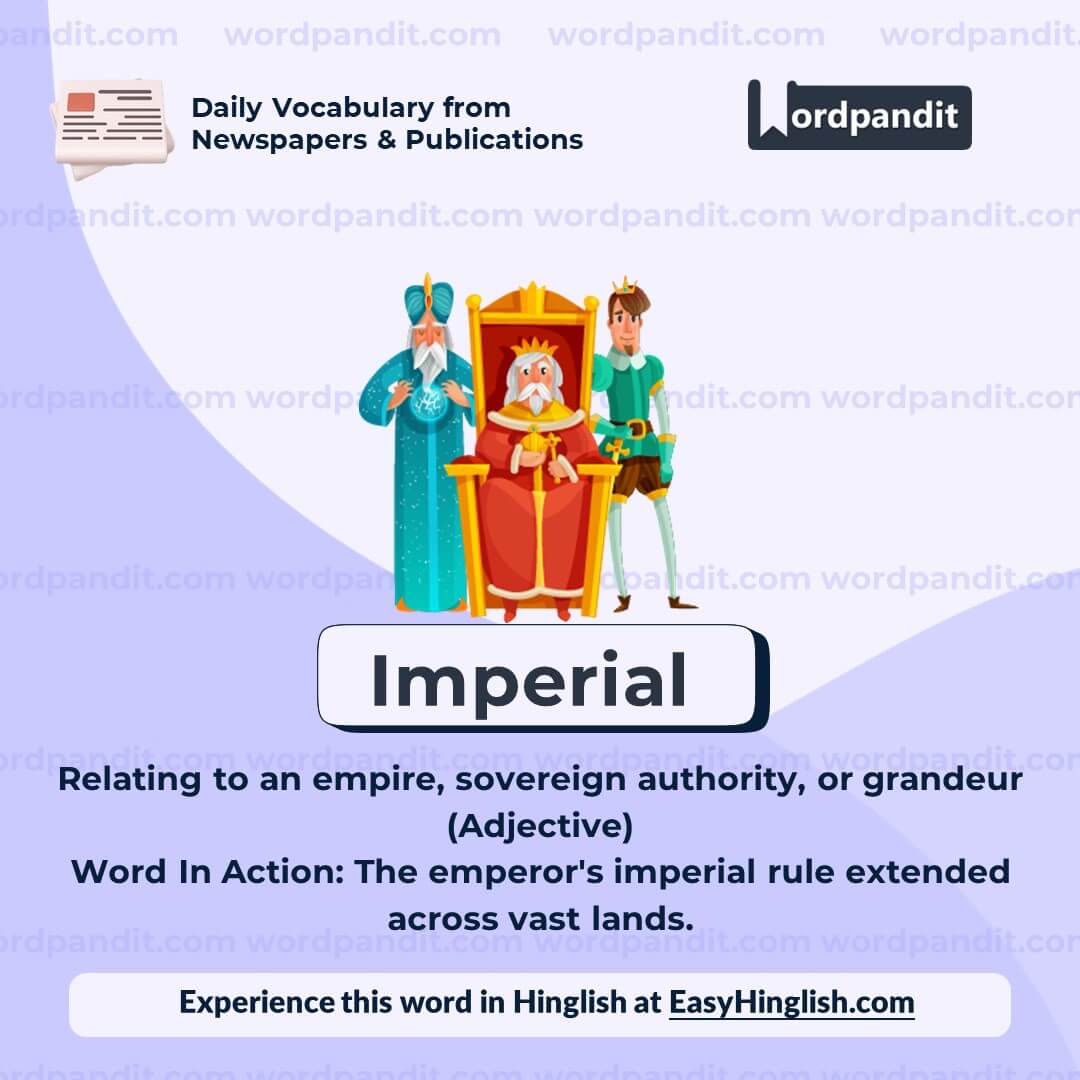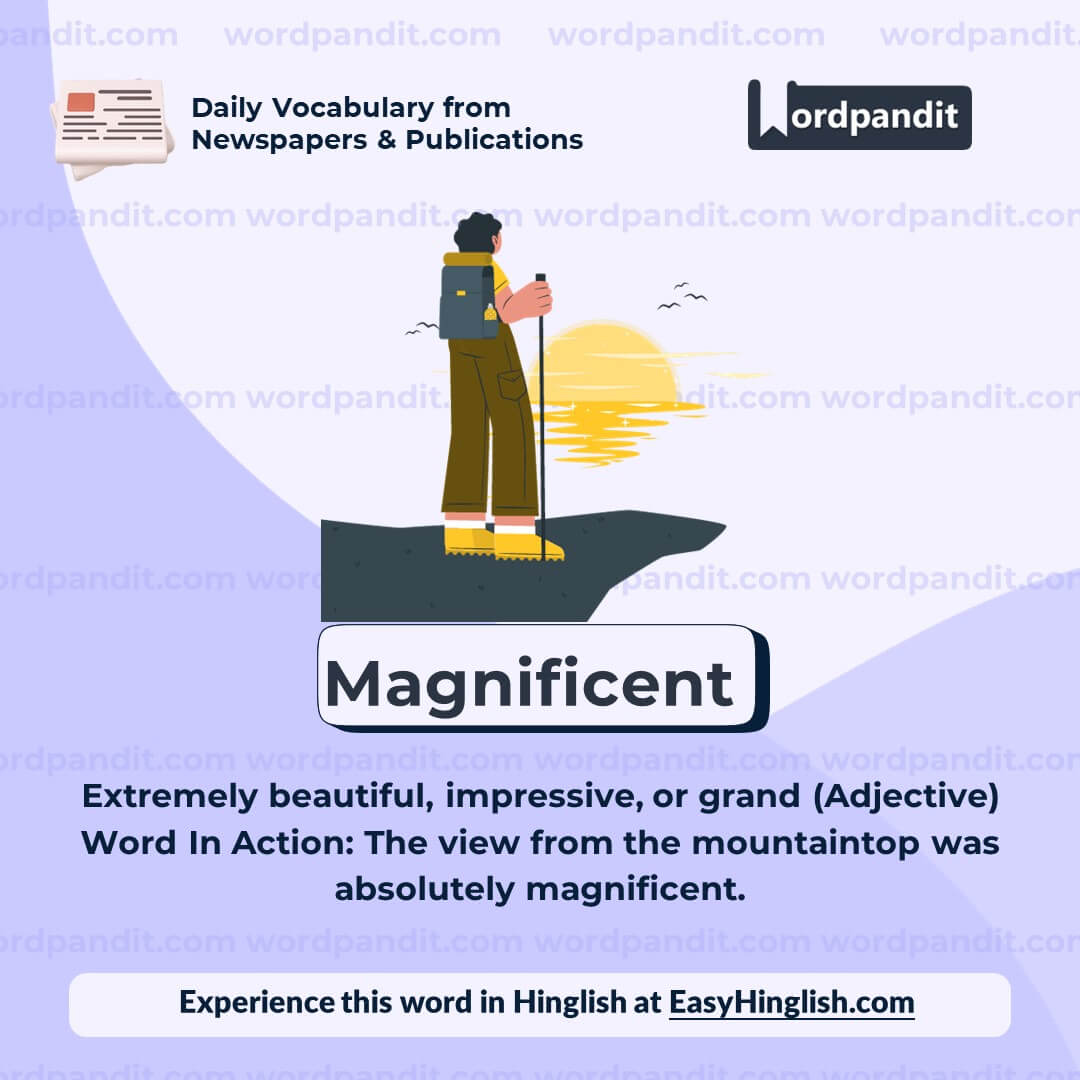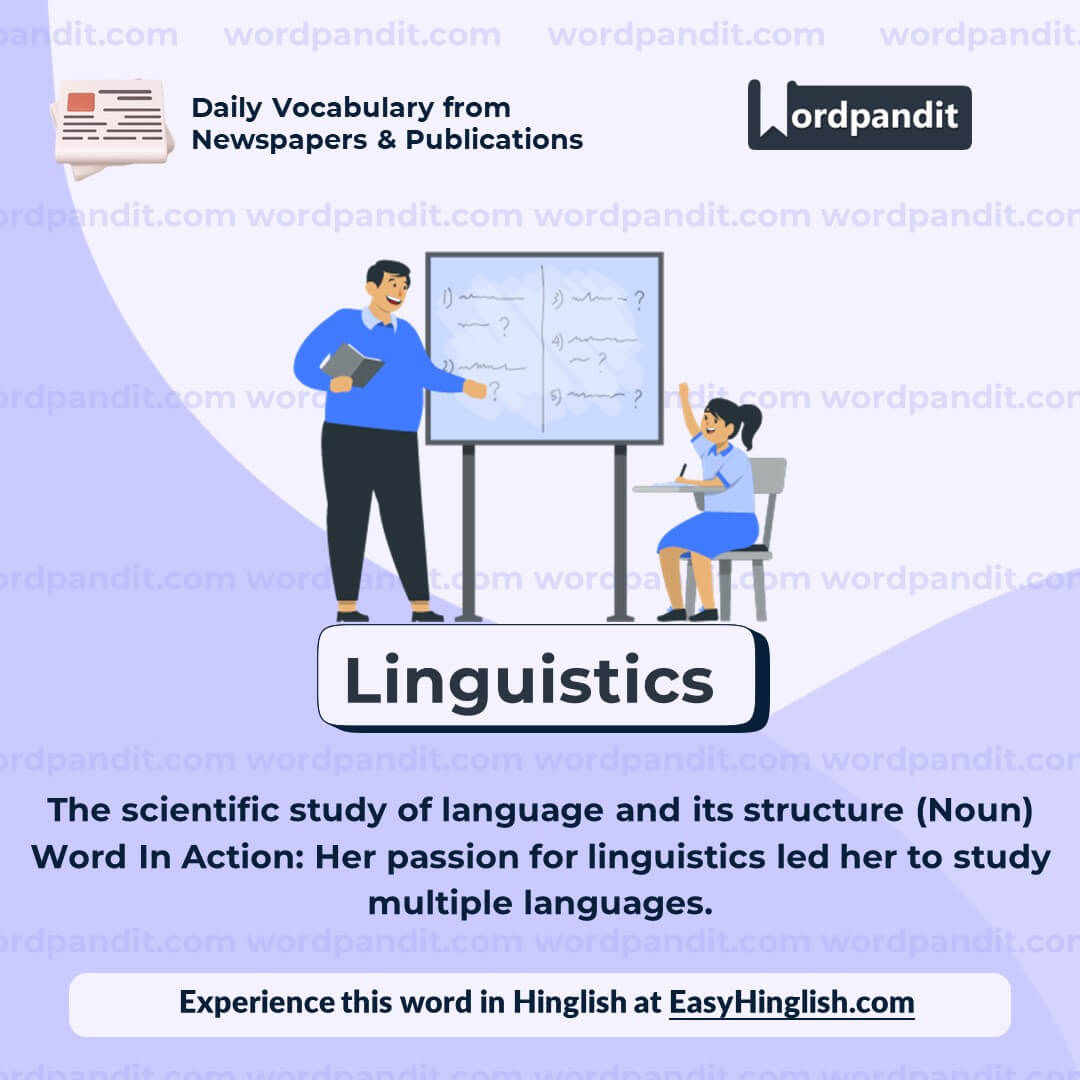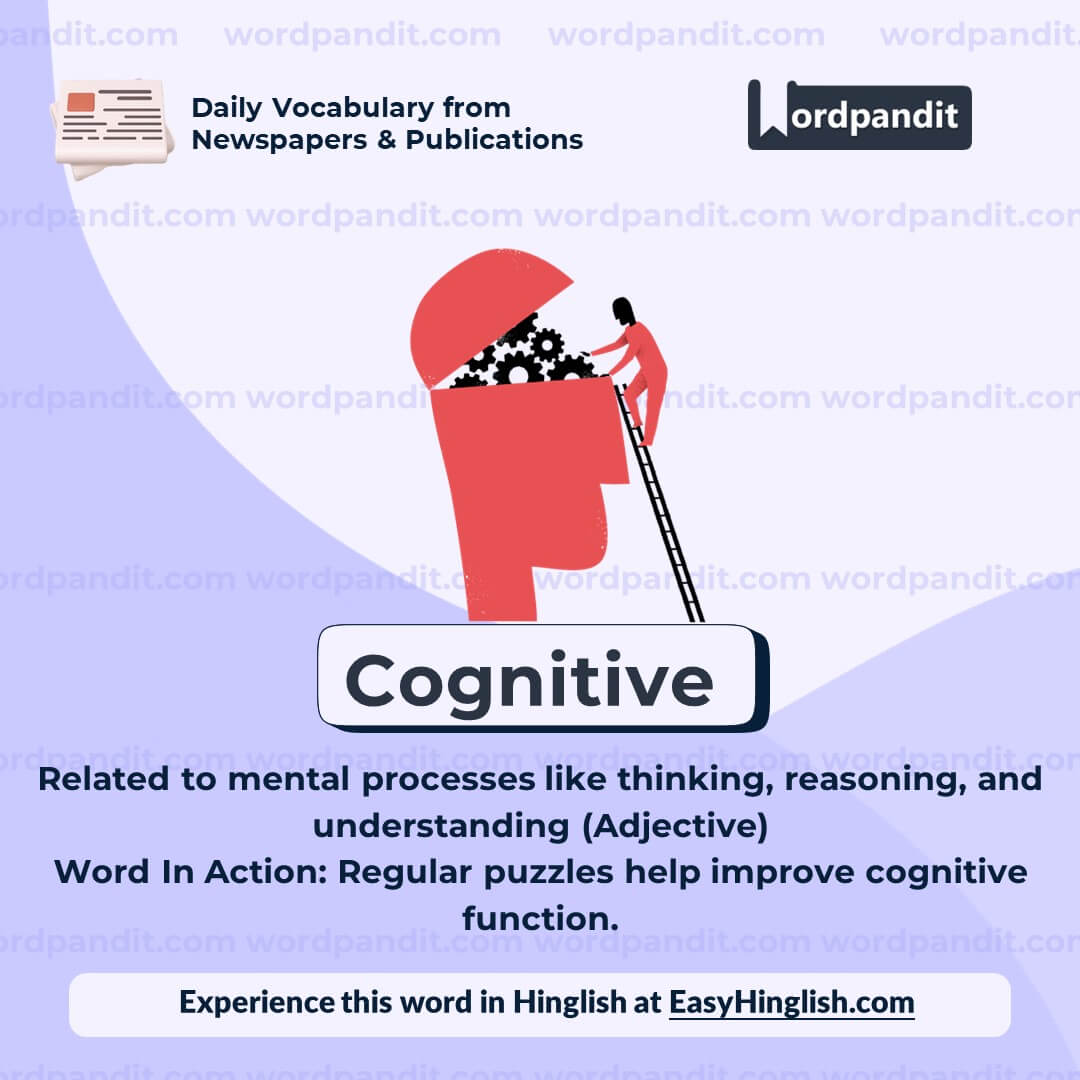Daily Vocabulary from International Newspapers and Publications
Expand Your Vocabulary with Wordpandit’s Global Vocabulary Hub
At Wordpandit, we are committed to helping you develop a truly global vocabulary by drawing from some of the most respected international publications. This section is designed to keep you ahead of the curve by introducing you to words that define global conversations and trends.
The Power of Global Sources
To help you think and communicate on a global scale, we curate vocabulary from renowned international sources, such as:
- The New York Times
- The Washington Post
- BBC
- The Guardian
- The Economist
- Scientific American
- Psychology Today
- And many more...
Stay Global, Stay Competitive
Our daily updates from international publications ensure you are consistently exposed to new words that reflect global news and developments, making sure your vocabulary is not only current but also globally relevant.
Enhance Your Global Perspective
Whether you’re preparing for international exams, aiming to excel in global business communication, or want to enhance your language skills for personal growth, Wordpandit offers the resources you need to thrive in a global context.
Effective Learning, Global Reach
Our learning methodology combines global examples, memory aids, and interactive activities, allowing you to internalize new words effectively and apply them in real-world scenarios.
Begin Your Global Vocabulary Journey Now!
Why Choose Wordpandit?
Practical Learning: Focus on words you'll actually encounter in real-world reading, enhancing your comprehension and communication skills.
Diverse Content: From current affairs to scientific breakthroughs, our varied sources expose you to vocabulary across multiple domains.
Effortless Integration: Make Wordpandit a part of your daily routine. Just a few minutes each day can significantly boost your lexicon over time.
Your Path to Vocabulary Mastery
- Visit our Daily Vocabulary section regularly
- Explore new words and their usage in context
- Practice incorporating these words into your own writing and speech
- Track your progress as your vocabulary expands
Start Your Journey Today
Embark on your vocabulary enhancement journey with Wordpandit. By consistently engaging with our daily posts, you'll build a robust vocabulary that serves you well in academic, professional, and personal contexts.
Remember, a word a day keeps linguistic limitations at bay. Make Wordpandit your daily companion in the quest for vocabulary excellence!
WORD-1: Imperial
Context:
"Filmed in a laboratory at Imperial College London, Laithwaite takes viewers through the history of electromagnetic machines – from Michael Faraday’s experiments in the 1830s up to his own innovations, which, at the time of filming, had yet to be widely adopted." - Aeon
Explanatory Paragraph:
The word "imperial" is often associated with empires, authority, or grandeur. It can describe something related to an empire, a ruler's power, or anything majestic and commanding. In the given context, "Imperial College London" refers to the prestigious institution named after the British Empire's influence. The word can also be used more broadly to describe things that are grand, dominant, or authoritative.
Meaning: Relating to an empire, sovereign authority, or grandeur (Adjective)
Pronunciation: im-PEER-ee-uhl
Difficulty Level: ⭐⭐⭐ Intermediate
Etymology: From Latin "imperialis," meaning "of the empire" or "belonging to authority," derived from "imperium" (command, sovereignty).
Synonyms & Antonyms:
Synonyms: Royal, majestic, grand, sovereign, authoritative
Antonyms: Common, humble, insignificant, subordinate
Usage Examples:
- The emperor’s imperial decree reshaped the political landscape of the kingdom.
- The palace was built with an imperial design, featuring towering columns and gold accents.
- Her imperial manner made her seem aloof and distant from her colleagues.
- The company’s imperial expansion into new markets led to both success and controversy.
Cultural Reference:
"The Imperial Palace in Tokyo is a symbol of Japan’s monarchy, showcasing a blend of traditional and modern influences." - National Geographic
Think About It:
How has the concept of imperial rule influenced modern political structures and global relations?
Quick Activity:
Write a short paragraph describing an "imperial city" from your imagination. What makes it grand and authoritative?
Memory Tip:
Think of "Imperial Star Destroyers" from *Star Wars*—they symbolize power, authority, and grandeur, just like the word "imperial."
Real-World Application:
The term "imperial" is used in politics (imperial rule), branding (Imperial Leather soap), and history (the Imperial era of Rome). Understanding this word helps in discussing governance, leadership, and historical events.
WORD-2: Tweaking
Context:
"With practical insight and hands-on experimentation, Laithwaite shows how, using the same fundamental scientific principles, engineers across generations built upon Faraday’s initial idea by tweaking his design." - Aeon
Explanatory Paragraph:
The word "tweaking" refers to making small changes or adjustments to something in order to improve it or make it more effective. It is often used in the context of refining a design, system, or process. In the given sentence, engineers "tweaked" Faraday’s design by making slight modifications to enhance its functionality without altering its core principles.
Meaning: Making small changes to improve or optimize something (Verb)
Pronunciation: TWEAK-ing
Difficulty Level: ⭐⭐ Beginner
Etymology: From Middle English "twiken," meaning "to pinch or pull," later evolving to mean making small adjustments.
Synonyms & Antonyms:
Synonyms: Adjusting, modifying, refining, fine-tuning
Antonyms: Ignoring, neglecting, leaving unchanged
Usage Examples:
- After testing the new software, the developers spent hours tweaking the code for better performance.
- She kept tweaking the recipe until she achieved the perfect balance of flavors.
- The musician tweaked his guitar strings to get the desired sound before the performance.
- The marketing team is constantly tweaking their strategy to stay ahead of competitors.
Cultural Reference:
"In Silicon Valley, startup founders often talk about tweaking their business models to adapt to market trends." - Forbes
Think About It:
What is something in your daily life that could be improved with a small tweak? How would you change it?
Quick Activity:
Think of a common household item and describe one way you would tweak its design to make it more efficient.
Memory Tip:
Imagine "tweaking" as slightly twisting a knob on a radio to get better sound—small adjustments lead to better results!
Real-World Application:
The concept of tweaking is essential in many fields, from technology and business to science and art. Engineers tweak machine designs, athletes tweak their training routines, and writers tweak their drafts for better clarity.
WORD-3: Magnificent
Context:
"Everybody I've spoken to loves the idea of the United States owning that piece of land, developing and creating thousands of jobs with something that will be magnificent in a really magnificent area that nobody would know." - BBC
Explanatory Paragraph:
The word "magnificent" describes something grand, impressive, or extremely beautiful. It conveys a sense of awe and admiration, often used to highlight places, achievements, or performances. In the given context, "magnificent" emphasizes the scale and splendor of the development project, as well as the area's beauty and potential.
Meaning: Extremely beautiful, impressive, or grand (Adjective)
Pronunciation: mag-NIF-uh-sent
Difficulty Level: ⭐⭐ Beginner
Etymology: From Latin "magnificus," meaning "great" or "noble," derived from "magnus" (great) and "facere" (to make).
Synonyms & Antonyms:
Synonyms: Grand, splendid, majestic, glorious, impressive
Antonyms: Ordinary, mediocre, unimpressive, dull
Usage Examples:
- The castle stood on the hill, offering a magnificent view of the valley below.
- The team delivered a magnificent performance, securing their victory in the championship.
- The artist’s magnificent painting was displayed in the museum’s grand hall.
- They stayed in a magnificent hotel with stunning architecture and luxurious rooms.
Cultural Reference:
"The Taj Mahal is considered one of the most magnificent architectural wonders in the world." - National Geographic
Think About It:
What is the most magnificent place you have ever visited, and what made it so special?
Quick Activity:
Write a short paragraph describing a magnificent moment in your life, using vivid details to convey its grandeur.
Memory Tip:
Think of "The Magnificent Seven," a famous movie title—just like the word, it suggests greatness and grandeur.
Real-World Application:
"Magnificent" is often used in travel writing, storytelling, and marketing to describe remarkable experiences, luxurious places, or outstanding achievements.
WORD-4: Linguistics
Context:
"This question has been the focus of a flourishing tradition since the 1950s which, at its best, draws together the fields of cognitive science, linguistics, and the philosophy of language (though philosophers as far back as Aristotle have been interested in metaphor)." - Psyche
Explanatory Paragraph:
The word "linguistics" refers to the scientific study of language, including its structure, history, and use. It explores how languages evolve, how they are learned, and how they function in society. In the given context, linguistics is mentioned alongside cognitive science and philosophy, indicating its role in understanding human thought and communication.
Meaning: The scientific study of language and its structure (Noun)
Pronunciation: lin-GWIS-tiks
Difficulty Level: ⭐⭐⭐ Intermediate
Etymology: From Latin "lingua" (tongue, language) and the Greek suffix "-istics," indicating a field of study.
Synonyms & Antonyms:
Synonyms: Language study, philology, grammar analysis
Antonyms: (No direct antonym, but could contrast with non-linguistic fields like mathematics or physics)
Usage Examples:
- Her research in linguistics focused on how children acquire multiple languages simultaneously.
- The professor explained how linguistics helps us understand the origins and evolution of languages.
- Computational linguistics is a field that combines language study with artificial intelligence.
- Many linguistics experts study dialects to see how languages change over time.
Cultural Reference:
"Noam Chomsky, a famous linguist, revolutionized the field of linguistics by introducing the theory of universal grammar." - The New York Times
Think About It:
How does studying linguistics help us understand human thought and communication better?
Quick Activity:
Pick a word in your native language and analyze its structure: What does it mean? How is it pronounced? Can you think of any related words?
Memory Tip:
Think of "linguistics" as "language statistics"—it helps break down and analyze how languages work.
Real-World Application:
Linguistics is used in fields like translation, artificial intelligence (voice assistants), language preservation, and even forensic investigations to analyze speech patterns.
WORD-5: Cognitive
Context:
"Naturally, there are further questions about the cognitive capacities that are employed in metaphor processing." - Psyche
Explanatory Paragraph:
The word "cognitive" relates to mental processes such as thinking, learning, reasoning, and memory. It is commonly used in psychology and neuroscience to describe how the brain processes information. In the given context, "cognitive capacities" refer to the brain’s ability to understand and interpret metaphors, which require abstract thinking and pattern recognition.
Meaning: Related to mental processes like thinking, reasoning, and understanding (Adjective)
Pronunciation: KOG-nuh-tiv
Difficulty Level: ⭐⭐⭐ Intermediate
Etymology: From Latin "cognitio" (knowledge, understanding), derived from "cognoscere" (to know, learn).
Synonyms & Antonyms:
Synonyms: Intellectual, mental, psychological, perceptive
Antonyms: Unthinking, instinctive, unconscious
Usage Examples:
- Playing chess regularly can enhance cognitive abilities like problem-solving and strategic thinking.
- Scientists study cognitive processes to understand how people make decisions.
- Reading challenging books helps improve cognitive development in children.
- After the accident, he underwent cognitive therapy to regain memory and reasoning skills.
Cultural Reference:
"Jean Piaget, a famous psychologist, introduced theories of cognitive development that explain how children’s thinking evolves over time." - Psychology Today
Think About It:
How do different activities like reading, playing music, or solving puzzles contribute to cognitive development?
Quick Activity:
Try a simple brain-training exercise: Memorize a short list of random words, wait five minutes, and see how many you can recall.
Memory Tip:
Think of "cognitive" as related to "cognition," which means knowledge or thinking—if something is cognitive, it involves mental effort.
Real-World Application:
Cognitive skills are essential in education, artificial intelligence (AI learning models), psychology, and daily decision-making. Understanding cognitive functions can help improve learning techniques and mental well-being.

















